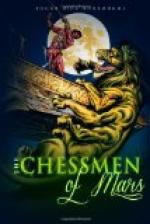“Just that!” he exclaimed. “Could aught be more wonderful?”
“Yes,” replied the girl, “I can think of a number of things that would be infinitely more wonderful.”
CHAPTER VI
IN THE TOILS OF HORROR
What the creature had told her gave Tara of Helium food for thought. She had been taught that every created thing fulfilled some useful purpose, and she tried conscientiously to discover just what was the rightful place of the kaldane in the universal scheme of things. She knew that it must have its place but what that place was it was beyond her to conceive. She had to give it up. They recalled to her mind a little group of people in Helium who had forsworn the pleasures of life in the pursuit of knowledge. They were rather patronizing in their relations with those whom they thought not so intellectual. They considered themselves quite superior. She smiled at recollection of a remark her father had once made concerning them, to the effect that if one of them ever dropped his egotism and broke it it would take a week to fumigate Helium. Her father liked normal people—people who knew too little and people who knew too much were equally a bore. Tara of Helium was like her father in this respect and like him, too, she was both sane and normal.
Outside of her personal danger there was much in this strange world that interested her. The rykors aroused her keenest pity, and vast conjecture. How and from what form had they evolved? She asked Ghek.
“Sing to me again and I will tell you,” he said. “If Luud would let me have you, you should never die. I should keep you always to sing to me.”
The girl marvelled at the effect her voice had upon the creature. Somewhere in that enormous brain there was a chord that was touched by melody. It was the sole link between herself and the brain when detached from the rykor. When it dominated the rykor it might have other human instincts; but these she dreaded even to think of. After she had sung she waited for Ghek to speak. For a long time he was silent, just looking at her through those awful eyes.
“I wonder,” he said presently, “if it might not be pleasant to be of your race. Do you all sing?”
“Nearly all, a little,” she said; “but we do many other interesting and enjoyable things. We dance and play and work and love and sometimes we fight, for we are a race of warriors.”
“Love!” said the kaldane. “I think I know what you mean; but we, fortunately, are above sentiment—when we are detached. But when we dominate the rykor—ah, that is different, and when I hear you sing and look at your beautiful body I know what you mean by love. I could love you.”
The girl shrank from him. “You promised to tell me the origin of the rykor,” she reminded him.




